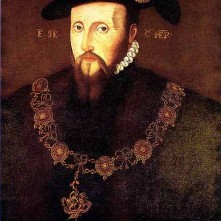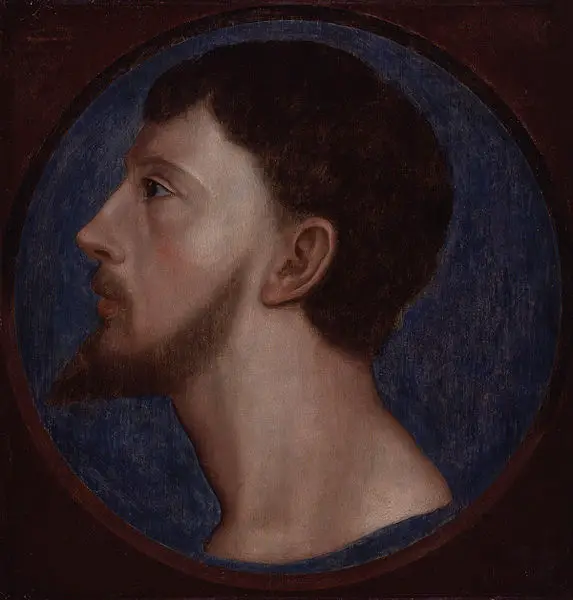19 January
1547 - The poet, courtier and soldier Henry Howard, Earl of Surrey and son of Thomas Howard, 3rd Duke of Norfolk, was executed by beheading on Tower Hill. He was laid to rest at All Hallows-by-the-Tower (All Hallows Barking), but was moved in 1614 by his son Henry, Earl of Northampton, to a beautiful tomb in the family church, St Michael's at Framlingham.1561 – Death of Sir Edward Carne, administrator and diplomat, in Rome. Carne carried out diplomatic missions for Henry VIII, was a Royal Commissioner during the dissolution of the monasteries, negotiated the marriage of Henry VIII and Anne of Cleves, and was Mary I's English ambassador to Rome.
1601 – Death of Henry Herbert, 2nd Earl of Pembroke, at Wilton, near Salisbury. Herbert was the son of William Herbert, 1st Earl of Pembroke, and Anne Parr, sister of Queen Catherine Parr. He was a friend of Robert Dudley, Earl of Leicester, and patron of the theatre company, Pembroke's Men.
1636 – Death of Marcus Gheeraerts, painter, in London. He is known for his “Ditchley” portrait of Elizabeth I.
20 January
1525 – Death of Richard Bere, Abbot of Glastonbury. He was buried in the south aisle of the nave of the abbey church.1557 - “The Queen's Grace's pensioners did muster in bright harness” before Mary I.
1558 – The state opening of the fifth Parliament of Mary I's reign. This is one of the only mentions of a public appearance by Mary after the second departure of her husband, Philip of Spain, in July 1557.
1569 - Bible translator and Bishop of Exeter, Miles Coverdale died. He was buried in the chancel of St Bartholomew by the Exchange, London, on 22nd January.
1607 – Death of Jacob Verzelini, glassmaker, in Crutched Friars, London. He was buried at Downe Chapel. His work, which includes a cylindrical crystal tankard with silver-gilt lid and base and goblets, can be found in the British Museum and in the Victoria and Albert Museum.
1618 – Death of Ferdinando Putlon, legal researcher and writer, at Bourton, near Buckingham. He was buried in the parish church at Desborough.
21 January
1510 – Henry VIII opened the first Parliament of his reign.1542 – Bill of Attainder passed against Catherine Howard, Henry VIII's fifth wife.
1543 - There was trouble in London. A group of half a dozen young men, including ringleader Henry Howard, Earl of Surrey, went on a five hour rampage smashing windows, shooting prostitutes using stonebows and shouting obscenities
1556 – Death of Eustace Chapuys, Imperial Ambassador at the English court from 1529-1545, at Louvain. He was laid to rest in the Chapel of Louvain College, the college he had founded.
1571 – Death of Walter Haddon, civil lawyer, reformer, MP and college head, in London. He was buried at Christ Church Greyfriars. As well as his work in colleges, Haddon is known for his polemical exchange with Portuguese priest Jerome Osorio da Fonseca who, in 1563, published an epistle calling for Elizabeth I to return to Catholicism, and Haddon was ordered by the government to reply.
1608 – Death of Sir Richard Lowther, soldier and landowner, at Lowther Hall. He was buried at the church in Lowther. His offices included Sheriff of Cumberland and Lord Warden of the West March.
22 January
1528 – Henry VIII and Francis I declared war on Charles V, Holy Roman Emperor.1552 - Former Lord Protector of England, Edward Seymour, Duke of Somerset, was executed by beheading on Tower Hill in London. He was laid to rest in the Chapel of St Peter ad Vincula at the Tower of London, and records show that he was buried next to Anne Boleyn in the chancel area.
1561 - Birth of Francis Bacon, Viscount St Alban, the Elizabethan Lord Chancellor, politician, philosopher, author and scientist, at York House in the Strand, London. Bacon is known as "the Father of the Scientific method" and developed an investigative method, the Baconian method, which he put forward in his book Novum Organum in 1620. Some people (Baconians) believe that Francis Bacon was the true author of William Shakespeare's plays.
1575 – Death of James Hamilton, 2nd Earl of Arran and Duke of Châtelherault, at Kinneil. Arran was appointed Regent for the infant Mary, Queen of Scots after James V's death in 1542, but surrendered the regency to Mary's mother, Mary of Guise in 1554.
1613 – Death of Sir David Williams, Serjeant-at-Law in Elizabeth I's reign and Puisne Justice of the King's Bench in James I's reign, from a fever at Kingston House, Kingston Bagpuize, Berkshire. His body was buried at St John's Chapel, Brecon, and his entrails were buried at Kingston.
23 January
1516 – Death of Ferdinand II of Aragon in Madrigalejo, Extremadura. He was laid to rest in la Capilla Real, the Royal Chapel of Granada. Ferdinand was the husband of Isabella I of Castile and the father of Catherine of Aragon, Henry VIII's first wife. Ferdinand was succeeded by his daughter, Juana (Joanna), who ruled jointly with her son, Charles, who became King Charles I of Spain.1540 – Birth of Thomas Egerton, 1st Viscount Brackley and Lord Chancellor to James I. Egerton was the illegitimate son of Sir Richard Egerton, a landowner from Cheshire, by a servant girl.
1571 – Official opening of the Royal Exchange in London by Queen Elizabeth I. It had been founded in 1565 by mercer and merchant, Sir Thomas Gresham.
1552 – Parliament met to discuss the revision of the 1549 “Book of Common Prayer”.
1554 – Baptism of Richard Edes, Dean of Worcester, at Newport on the Isle of Wight. He became Dean of Worcester in June 1597. Edes was also Chaplain and Court Preacher to Elizabeth I and James I.
1570 – Assassination of James Stewart, 1st Earl of Moray, illegitimate son of James V and Regent for James VI between 1567 and 1570. He was shot in Linlithgow by assassin James Hamilton of Bothwellhaugh. The hit was ordered by the Hamilton family, supporters of Mary, Queen of Scots.
1576 – Death of James Pilkington, Bishop of Durham. He was buried at the church of St Andrew, Bishop Aucklan, but then moved later that year to Durham Cathedral.
1584 – Death of John Watson, Bishop of Winchester, in Winchester. He was buried in Winchester Cathedral.
1600 – Death of John Case, writer and philosopher. He was buried in the chapel of St John's College, Oxford. Case is known for his commentaries on the works of Aristotle.
1620 – Death of Sir John Croke, Judge and Speaker of the House of Commons, in Holborn, London. He was buried at Chilton, Buckinghamshire. He was elected as Speaker of the House of Commons in October 1601.
24 January
1502 – Henry VII ratified a peace treaty, the Treaty of Perpetual Peace, with James IV of Scotland. Part of this treaty was the agreement of a marriage between Henry VII's daughter, Margaret, and James.1503 – The foundation stone of King Henry VII's chapel was laid at Westminster Abbey.
1536 - The forty-four year-old King Henry VIII had a serious jousting accident at Greenwich Palace.
1555 – A great joust was held at Westminster between English and the Spanish knights – “grett ronnying at the tylt at Westmynster, with spayrer, boyth Englys men and Spaneards”.
1566 – Death of Rowland Meyrick, Bishop of Bangor. He was buried at Bangor Cathedral.
1597 – Death of Thomas Molyneux, Elizabeth I’s Chancellor of the Court of Exchequer, and Receiver of Customs and Imposts on Wines, in Dublin. He was buried in Dublin's Christ Church Cathedral.
1634 – Death of Nathaniel Giles, composer, Organist and Choir master at St George's Chapel, Windsor and the Chapel Royal. He was Choir Master at Windsor for forty-nine year. A memorial tablet to him can be found on the floor of Rutland Chapel in St George's Chapel.
25 January
1533 - Henry VIII secretly married Anne Boleyn at Whitehall.1540 – Birth of Edmund Campion, Jesuit and martyr St Edmund Campion, in London. He was hanged, drawn and quartered on 1st December 1581 for treasonable conspiracy. Campion was beatified in 1886 by Pope Leo XIII and canonized in 1970 by Pope Paul VI.
1554 – Thomas Wyatt the Younger raised his standard in Maidstone, and other rebels in Kent made simultaneous proclamations in Rochester, Tonbridge, Malling, and Milton.
1559 – Elizabeth I's first Parliament was inaugurated.
1567 – Death of Sir William Hewett, Lord Mayor of London from 1st September 1559.
1586 – Robert Dudley accepted the title of Governor-General of the Netherlands.










Leave a Reply